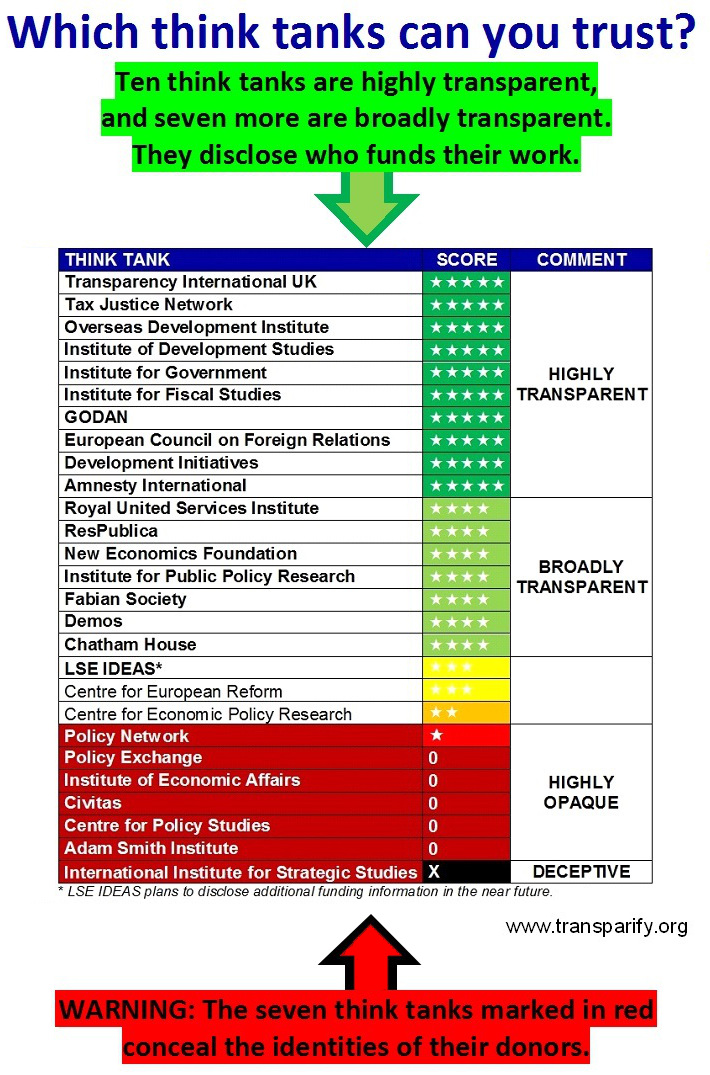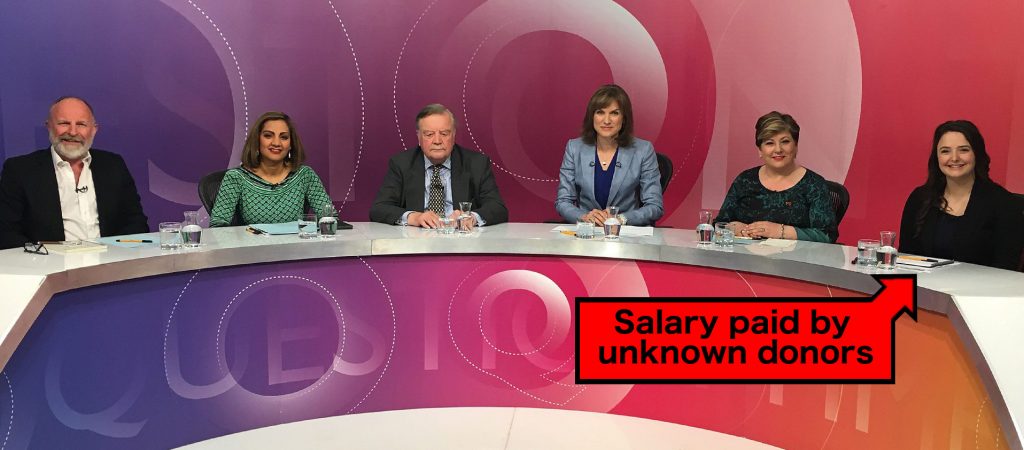Last week’s Question Time introduced one of the panelists, Kate Andrews from the “Institute of Economic Affairs“. What an organisation name! It sounds so official. So governmental. So trustworthy
…yeah not so much.
The name sounded familiar to me from some recent reading on dodgy think tank funding transparency. It prompted me to look up their rankings on transparify.org:

I’ve improved this image from one found on the transparify blog. You can read much more about how and why transparify have ranked the think tanks on the website. Transparify have zoomed in on the issue of funding transparency because it’s important. If we are to have these “think tank” organisations dedicating themselves to swaying public opinion one way or another, then isn’t it important to know who is paying them to do it?
Well maybe it depends how influential they are. It occurs to me that “think tanks” exist as part of a fuzzily defined spectrum. An individual can set up a wordpress site and start pumping out blogs and social media posts pushing their political viewpoint. That’s a wonderfully easy thing to do, and I’m glad. But then if you name this website “Institute of X” and pretend to be an organisation not an individual, then you’re well on the way to being a “think tank”. If some wealthy backer wants to pay you to hire a team, and work on pumping the messages full time, then that is a think tank. It’s a natural progression to this situation where it feels like there’s a cost-effective way for wealthy individuals or organisations to buy influence over our politics.
But it’s OK. The key remaining barrier is whether we all grant them acceptance and influence (and whether mainstream media do e.g. by inviting them to be panelist on BBC Question Time!). We should be rejecting organisations who fail to disclose exactly what they are, who they are, and who they are funded by. If we don’t know who is paying the salary of Kate Andrews from the “Institute of Economic Affairs”, isn’t it rather sinister that she has been able to gain such a platform?
If you saw the show then you may remain unconvinced, after all Kate Andrews was talking a lot of sense on there right? She’s intelligent, charismatic, and persuasive. I was finding myself agreeing with her even as I was surfing around the transparify website! I was waiting for her to drop a right-wing free-market help-the-rich-get-richer bombshell. She talked on a lot of topics without touching on this, and when it came it was so subtly slipped in at the end of a debate on climate change, that it passed without any cross-examination.
Maybe that’s just good politics. Don’t try to ram your message down people’s throats. Say things that people agree with, and slip your message in. But I suspect that kind of obfuscation game is a think tank speciality. A while ago I followed a tweet to humanprogress.org, and it’s bothered me ever since, because again I found myself agreeing with so much of it. I enjoyed these optimistic pro-science articles, but look out! Slipped in there you’ll find various dubious messages: “inequality doesn’t matter”, “deforestation isn’t happening”, “fossil fuels are the best energy source”, “be happy with your menial existence and help us get richer”. OK I made that last one up, but the others are all messages in articles on that site, all cunningly tucked between other more enjoyable (and more correct) writing. humanprogress.org is one of many sub-brands of content pumped out by the American right wing think tank with wealthy backers: Cato Institute.
But I guess that’s just dodgy politics as usual, and I’m criticising Cato Institute based on my own political views. I’m quite happy to do so, but to be fair, they do OK on financial transparency. Middling score from transparify.
What transparify do so well is to focus on just that one aspect of think tanks, financial transparency, in a non-partisan very objectively measured manner. It’s possible to do so, and while it won’t solve all the problems with dodgy think tank politics, it is a great starting point for penetrating the sinister goings on behind these organisations. It should be a clear “untrustworthy” red flag if organisations regardless of political flavour, are failing to disclose details of who is backing them financially.
Which dodgy characters will the BBC be inviting onto Question Time tonight I wonder?

Coincidentally the British Medical Journal just put out this piece about the “Institute of Economic Affairs”: Big tobacco, the new politics, and the threat to public health.
“The IEA is secretive about its funding sources, but The BMJ can report that the organisation is part funded by British American Tobacco. In the past it has also taken money from the gambling, alcohol, sugar, and soft drink industries. Meanwhile, politicians with links to the IEA seem to be progressing ever closer to power”.
They’re focussing on healthcare aspects, which seem pretty serious. The IEA has lobbied the government against evidence-based life-saving health policies “In the past year alone it has issued more than a dozen statements criticising everything from alcohol controls to sugar taxes” …all while trying to keep very quiet about their funding from big tobacco, and coca cola. I’m sure their other funding sources would present similar glaringly inappropriate influence across other policy areas (if only we knew what those funding sources were).
The article also exposes a flow of money to a network of tory MPs who themselves are set to become increasingly influential. So the IEA is not only putting out articles, and weedling their way onto TV shows to sway public opinion. The organisation is also a secretive funding back-channel of conservative politicians (sometimes via sub-organisations like “American Friends of the Institute of Economic Affairs”) from the likes of British American Tobacco.
A guardian article from back in 2011 Secretive thinktanks are crushing our democracy.
“The harder you stare at them, the more they look like lobby groups working for big business without disclosing their interests. Yet the media treats them as independent sources of expertise. The BBC is particularly culpable. Even when the corporate funding of its contributors has been exposed, it still allows them to masquerade as unbiased commentators”
when money talks the world listens..
Ditched my bbc license many moons ago.
Good post(s) thanks.
Fresh analysis from George Monbiot in the guardian today: Rightwing thinktanks run this government. But first, they had to capture the BBC